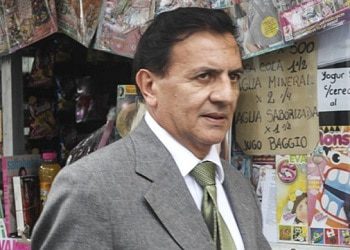A federal judge in Argentina who was once lauded for his anti-narcotic efforts is facing charges that he colluded with drug traffickers and resold confiscated cocaine, in a landmark case that illustrates Argentina’s ongoing efforts to combat corruption within its judiciary.
Argentine authorities have uncovered evidence that former federal judge Raúl Reynoso may have used his office to divert cocaine seized in official operations back to the black market.
The theory is backed up by the recent discovery of a document signed by Reynoso in April 2012 and sent to local customs officials, in which the judge authorized two of his employees to use their personal vehicles to transport cocaine that was seized and meant for destruction, La Nación reported on February 20.
Prosecutors allege that the seized cocaine meant for disposal was never destroyed, but rather was sent over the border into Bolivia to be repurchased from the original owners.
Reynoso, currently in pretrial incarceration, was charged last year with trafficking more than a metric ton of the drug. The judge is also facing several other charges involving a total of two metric tons of cocaine worth an estimated $12 million, according to La Nación.
These latest revelations add to growing evidence that Reynoso was directly involved in drug trafficking — despite the fact he was once praised by former President Cristina Fernández de Kirchner for his 11-year career in the northern town of Orán on the Bolivian border, a major drug entry point.
Since November 2015, authorities have levied a series of increasingly grave charges against Reynoso, beginning with accusations he offered traffickers lenient sentences in exchange for bribes.
Several other officials have also been charged in relation to this case. Reynoso, for his part, continues to deny any criminal wrongdoing.
InSight Crime Analysis
The accusation that a central judiciary figure — who at times handled up to 7,000 drug trafficking cases in one of Argentina’s most strategic drug entry points — not only worked with traffickers but headed a criminal structure of his own speaks to the magnitude of corruption within Argentina’s judiciary and the challenges authorities face as they attempt to tackle the issue.
Although Reynoso’s case stands out as being one of the first in which a federal judge is directly implicated in drug trafficking, it is not an isolated incident. Other Argentine judges and officials from essentially all state institutions involved in anti-narcotic efforts have been accused of facilitating criminal activities or leading trafficking structures of their own.
Coverage of Argentina
At the same time, Reynoso’s case suggests the Argentine government is taking steps to address the problem of judicial corruption.
Authorities are soon to release the conclusions of an internal audit of judicial corruption, and recently announced a profound modification of the penal code — including a measure for mandatory minimum sentencing for certain crimes that would take away some of the judges’ sentencing prerogatives. This could potentially clamp down on the use of bribes to secure lenient sentences, as is suspected in Reynoso’s case, but the measure is unlikely to significantly reduce drug trafficking could have adverse consequences for human rights.
The current administration has also been working on a series of proposals for the past two years to make structural changes to the criminal justice system, including a move toward establishing an accusatorial process for prosecutions. Scholars have argued that such a shift can reduce corruption and improve efficiency by relieving judges from much of the investigative powers they retain under the inquisatorial systems that are prevalent in much of Latin America.

